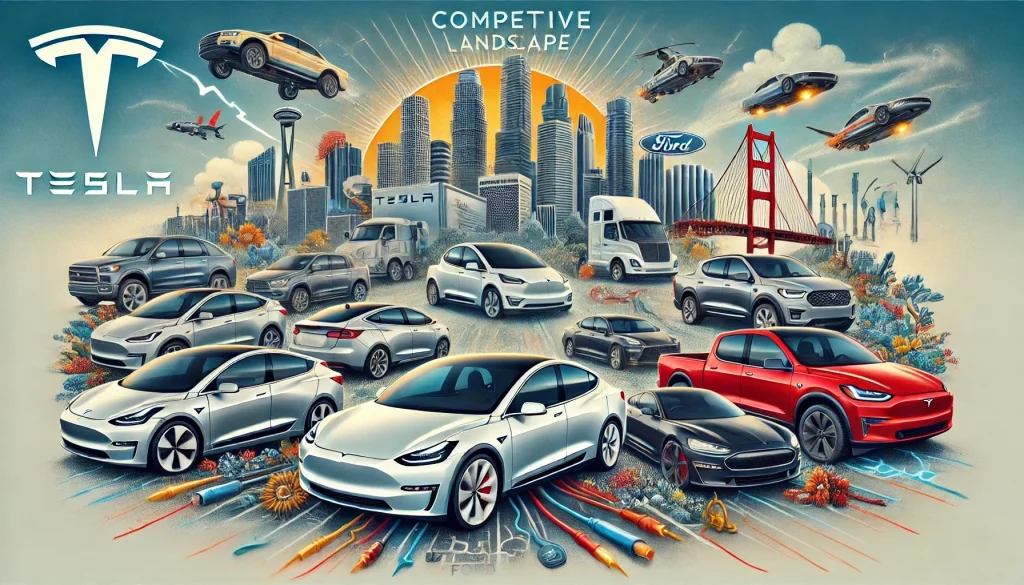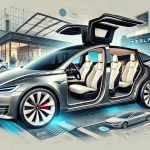Tesla, a pioneer in the electric vehicle (EV) market, has long been a leader in innovation and technology. However, the landscape of the EV market is rapidly evolving, with both traditional automakers and new players emerging as strong competitors. This article explores Tesla’s competition, including traditional car manufacturers and new entrants in the EV market, and analyzes Tesla’s competitive advantages and disadvantages.
One of Tesla’s primary competitors is General Motors (GM), which has made significant strides in the EV market with its Chevrolet Bolt and upcoming models like the GMC Hummer EV and Cadillac Lyriq. GM’s extensive manufacturing capabilities and established brand presence give it a competitive edge. However, Tesla’s advanced software and autonomous driving features continue to set it apart.
Another significant competitor is Ford, which has entered the EV market with models like the Mustang Mach-E and the upcoming electric Ford F-150. Ford’s deep-rooted customer loyalty and robust dealership network provide it with a strong foundation. Despite this, Tesla’s expansive Supercharger network and over-the-air software updates offer advantages that Ford is still catching up to.
New players in the EV market, such as Rivian and Lucid Motors, are also gaining traction. Rivian’s focus on electric trucks and SUVs with models like the R1T and R1S has captured significant attention, particularly in the adventure and utility segments. Meanwhile, Lucid Motors is targeting the luxury EV market with its Lucid Air, boasting impressive range and performance metrics. These newcomers bring fresh perspectives and innovations, pushing Tesla to continually innovate.
European automakers like Volkswagen and BMW are also significant competitors. Volkswagen’s ID. series, including the ID.4 and the upcoming ID.Buzz, represents a strong push into the EV market. BMW continues to expand its i-series lineup, focusing on performance and luxury. These companies benefit from their long-standing reputations for quality and engineering excellence.
Tesla’s competitive advantages include its strong brand recognition, a loyal customer base, and a significant lead in battery technology and energy efficiency. Additionally, Tesla’s integrated ecosystem, encompassing solar energy products and energy storage solutions, provides a unique value proposition that competitors are yet to match comprehensively.
However, Tesla faces challenges such as production scalability and quality control issues. Traditional automakers have decades of experience in mass production, giving them an edge in this area. Furthermore, as more competitors enter the market with compelling products, Tesla must continuously innovate to maintain its leadership position.
In conclusion, while Tesla remains a dominant force in the EV market, the competition is intensifying. Traditional automakers and new entrants alike are pushing the boundaries of innovation, challenging Tesla to uphold its pioneering spirit. The future of the EV market will be shaped by the ongoing competition and advancements from all players, driving the industry towards a more sustainable future.



I’m in favor of healthy competition between manufacturers. It’s good to see that Tesla has some new competitors.
Im in favor of healthy competition between manufacturers. It’s good to see that Tesla has some new competitors.
HAha yo why u double postin tho? 😂😂 u tryna make sure we see it or what?
Intense EV race! 🚘 Tesla’s got stiff competition from GM, Ford, & new players. Everyone’s innovating hard—exciting times ahead! ⚡💨
Yesss, thats what Im talkin about! All for some healthy competition!🔥
tesla’s got rivals now, huh interesting times are coming